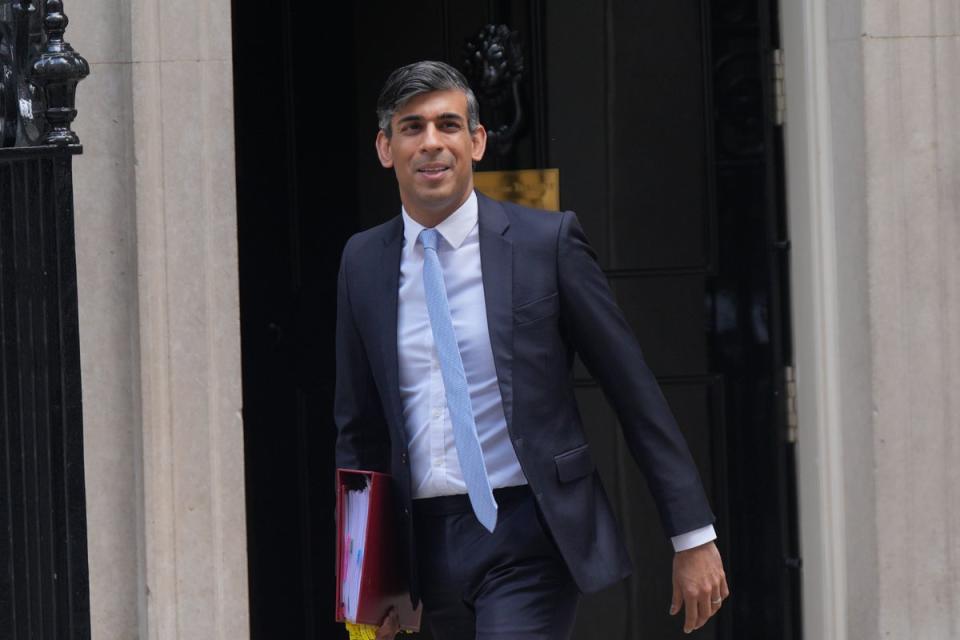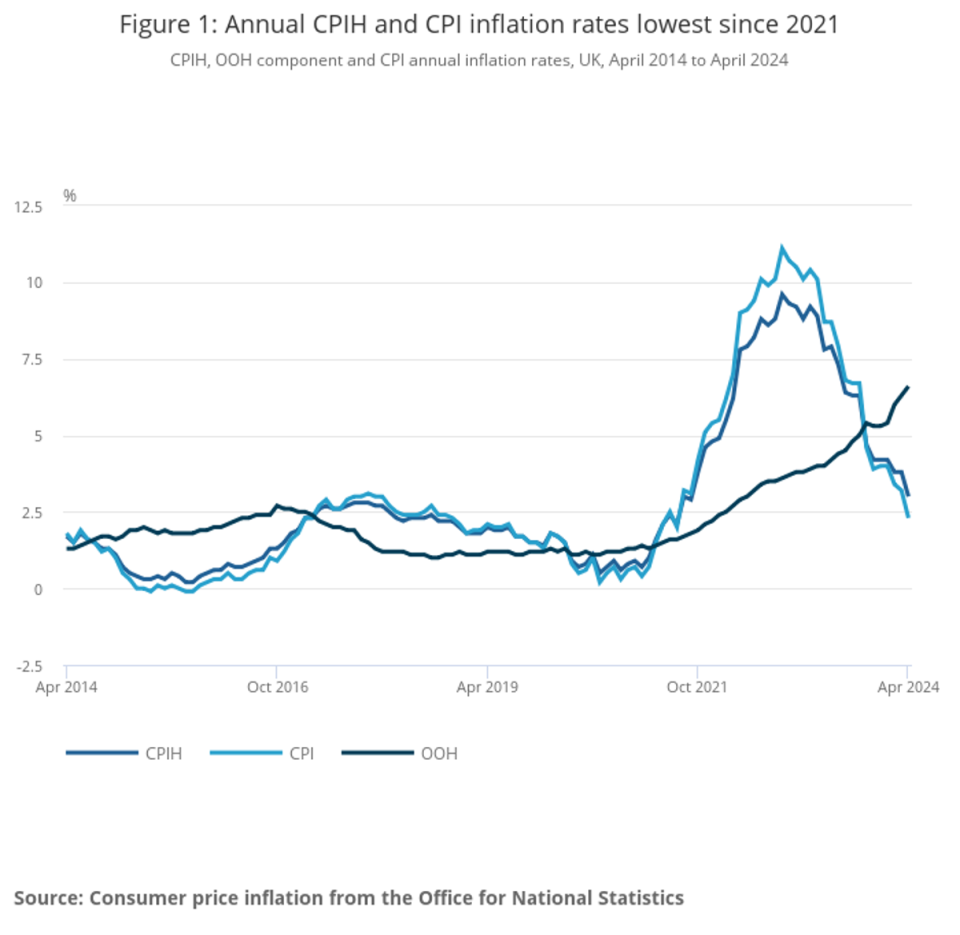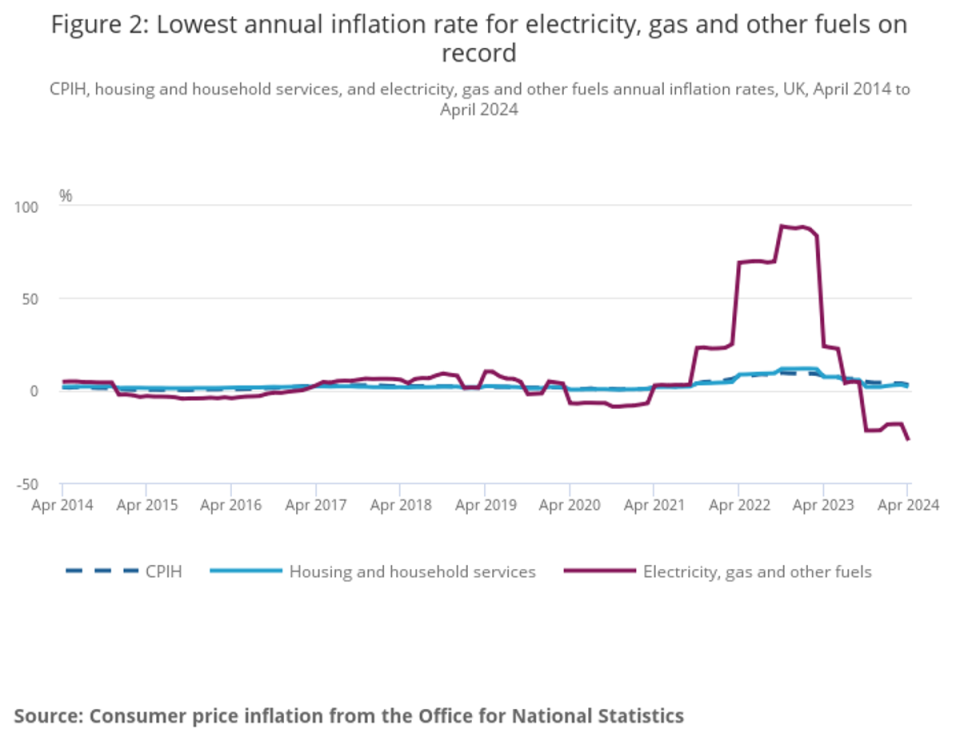UK interest rate cut more likely in August as inflation falls less than expected to 2.3% in April

UK inflation has dropped by less than expected, despite falling gas and electricity prices, making it less likely that the Bank of England will lower interest rates at its next meeting in June.
The figures showed that prices for consumer goods rose 2.3 per cent in the year to April, down from 3.2 per cent in March.
It marks the lowest level since July 2021, however it is still 0.3 percentage points higher than the Bank’s target figure of 2 per cent, and higher than the 2.1 per cent forecast by City analysts.
Services inflation, which is also a critical indicator for Bank policymakers, dipped slightly from 6 per cent in March to 5.9 per cent in April, coming in ahead of the 5.4 per cent rate that some forecasters had been predicting, according to the data, released by the Office for National Statistics (ONS).
Economists think that the higher-than-expected inflation figures make it less likely that the Bank will cut interest rates from 5.25 per cent in its meeting on 20 June, and more likely the first drop will come in August.
Responding to the figures, Suren Thiru, economics director at the Institute of Chartered Accountants in England and Wales, said that a June rate cut was now “unlikely” due to lower-than-expected inflation figures and disappointing services inflation.

He said: “This underwhelming drop in inflation suggests that the UK is rather stumbling back towards the Bank of England’s 2% target, as lower energy bills had a smaller than expected impact on April’s headline rate.
“Concern over hotter than expected headline inflation is exacerbated by disappointing declines in core and services inflation, which suggest that the problem of underlying price pressures embedded in the wider economy have yet to be solved.
“The headline rate is set to drop markedly over the summer, once the expected decline in Ofgem’s energy price cap cuts people’s energy bills from July.
“Lingering concerns over underlying inflationary pressures mean a June rate cut is unlikely. However, these figures may convince more rate setters to vote to ease policy, providing a signal that a summer rate cut is still possible.”
Paula Bejarano Carbo, economist at the NIESR think-tank, said Wednesday’s figures were “positive news” but that the Bank could still decide to hold interest rates as inflation could rise again.

She said: “Inflation has fallen to its lowest level in almost three years. This is positive news, however inflation remains above the Bank of England’s 2 per cent target.”
Policymakers at the central bank have hiked interest rates over the past two years to 5.25 per cent in a bid to tackle inflation.
Riz Malik, director at R3 mortgages said that although the drop in inflation is welcome, the fact it is below expectations is a blow to hard-pressed mortgage holders.
He said: “Considering this time last year CPI inflation was 8.7 per cent, we have come a long way. The next inflation data will come before the Bank of England make their June decision so an interest rate cut in June could still be on the cards. Everything is crossed for that first cut in June, which households so desperately need.”
Prime minister Rishi Sunak, who has made getting inflation under control one of his key economic pledges, struck a more positive note.
He said: “This is proof that the plan is working and that the difficult decisions we have taken are paying off. Brighter days are ahead, but only if we stick to the plan to improve economic security and opportunity for everyone.”
Shadow chancellor Rachel Reeves said: “Inflation has fallen, but now is not the time for Conservative ministers to be popping champagne corks and taking a victory lap.
“After fourteen years of Conservative chaos families are worse off. Prices in the shops have soared, mortgage bills have risen and taxes are at a seventy year high.”
TUC general secretary Paul Nowak said that despite the fall in inflation the “cost of living crisis is not over” and that millions are still cutting back from everyday essentials.
He said: “Prices are still going up. Food and energy bills are much higher than a couple of years ago. And many are being hit by soaring mortgage repayments.”

 Yahoo Finance
Yahoo Finance 